#at least in west and north Europe
Explore tagged Tumblr posts
Text
I just want to add to this that as usual I think Martin gets too much credit—he’s an edgelord with an inch deep understanding of history, mostly gleaned from old movies. The discussion above is 100% correct that the War of the Ring is logistically a very different war from the wars in ASOIAF, *but* also ASOIAF’s model is (despite the aesthetic) early modern warfare like the English Civil War or the Thirty Years’ War, which was especially destructive. Tolkien’s exemplar for how wars are fought in his books is much more medieval, and I think you see this in both his model of how leadership works and in the literary parallels.
Outside of very destructive wars like the Theory Years’ War, my understanding is that unbridled pillaging of the countryside was really rare. For the obvious reason that if you did that every time an army passed through, *all the peasants would starve to death* and there would be no more peasants to grow food to support your army on the march. Yes, you gleaned supplies from the region as you marched to feed your soldiers, but there was a hard limit on how much you could take before it drastically hampered future operations in the same area, and commanders weren’t stupid and knew this.
The Middle Ages were violent but that violence was of a much lower intensity for the most part than the Early Modern period; you don’t get the return of really destructive large scale wars until state capacity supports very large armies again—so “feudal armies” mostly aren’t the problem. Tolkien definitely depicts retinue-of-retinue style feudal armies, and ones which moreover mostly operate well within the range of their home logistical networks, but even so, Aragorn/Gandalf/Theoden aren’t stupid and know how to conduct careful operations, so they probably wouldn’t (knowingly) permit their soldiers to endlessly pillage in the fashion of armies in ASOIAF. It’s not that they’re unrealistically virtuous; it’s that Martin is unrealistically cynical.
Say what you will about the politics of A Song of Ice and Fire, 'a feudal army marching through the countryside doesn't become any less horrific, abuse-filled and starvation-causing for the local peasantry just because they're the Good Guys' is really a point that like 90% of epic fantasy that's trying have any sort of serious/coherent morality could stand to learn.
#obviously I am speaking in general trends#you do get medieval instances of horrible violence#but they shocked and appalled commentators#and there were strong pushes to try to limit violence#like the peace and truce of god movements#also in the early Middle Ages that are tolkiens aesthetic exemplar#the population density was just too low for large scale warfare#at least in west and north Europe#which I think mostly accords with what we see of middle earth#outside Gondor and the far south there just aren’t#many large population centers
10K notes
·
View notes
Text

Consider Yelan's facial expression to be my own in reaction to opinions shared on both X and Tumblr, and I guess I'm in the minority of the 'loud ones', but I'm pretty excited for Natlan since that trailer, actually. The previous teasers left me a little 'eh', but this definitely got my hopes back up, and I'm back in the right spirits for it (and ready to catch some Pokémon.)
Now I wouldn't be me if I didn't touch on the salt that I've seen scattered across the dash, so here I go. Listen, I read people's objections and I see what you're all aiming at, but in that light want to note that it's often incredibly easy to point fingers (arguably too much so) at others while being, quite honestly, hopefully rather aware that many of our own countries, cultures, and its populations across the board (and no, I'm not excluding anyone here) would likely be just as easily guilty as MHY is with these things. And no, I'm not blindly defending them, but I also won't point fingers at only one without pointing them everywhere else as well, including those you might think would 'never do such things', because I'm absolutely certain that they would. /continues on in the tags.
#we all wear biased lenses. and no-- 'informing yourself through social media' doesn't make you aware of how cultures work/look.#people informing themselves through social media is the /worst trend/ that the 2000/2010s have ever brought us. it's insane.#i'm sorry i'm also very tired of people deciding who are minorities and when. and who is allowed to 'get away with things' and who aren't.#and who is guilty and who isn't. and how “everyone is supposed to do everything right” when most people don't even know...#how the culture of their neighboring country genuinely looks outside of simple stereotypes (and usually only bad ones).#we also need to ultimately realize that mhy is chinese. it has (uniquely) gotten a lot of praise for its presentation of japanese culture.#(from what i hear) which is incredibly rare for a chinese company (and others). and then...#it's doing cultures further away from its own less justice. it didn't exactly do mondstadt great. it played into stereotypes.#and then combined them from multiple cultures. same with fontaine. it played into stereotypes /yet again/ in the same way the west does it.#and not just stereotypes from one country and culture. but /several/. but do most people who aren't familiar with those cultures know this?#no. they don't. and why would they? look at even just the west. europe and north america think that they're similar. /they are so not/.#if WE can't/won't even get it right. and yet we pretend to every damned day; why are we condemning a country halfway across the globe?#and also no-- i don't think latam or africa would portray china properly. or france. or the states.#... but you know what all this'll still do? cause people to look up and go 'hey this is so cool-- i want to know the inspiration'.#and people will still look into it. and people will learn.#and people will be drawn to them in life outside of their homes. or at least the ones who want to touch grass. and maybe even foreign grass#sanity knows i've looked infinitely more into chinese culture and customs because of liyue than ever before. with a much higher...#interest than i've ever admittedly had in regards to china. /ever/. just like i've had other games do the same for other cultures...#way across the globe.#[ salt. ] should i be quieter next time? / no. no… it's fine. children don't learn unless you shout at them.#[ out of character. ] don't bend or water it down. don't try to make it logical. rather: follow your most intense obsessions mercilessly.
11 notes
·
View notes
Text
brb putting way too much thought into the "forgien nations" in kusuriya no hitorigoto
#kusuriya no hitorigoto#my hypothesis is that consort gyokuyo is central asian and probably from bukhara or samarkand#and the visiting envoys are most likely from the ottoman empire imo#off chance that it's russia but the description of their country 'holding a trading route from west to north'#feels to me that it implies that they hold istanbul#and russia wasn't as deeply involved with the silk road trade as the ottoman empire was in the time period i assume this manga is set in#on the other hand their fashion seems to be very much in the western style as opposed to what i've seen of ottoman women's court fashion#or at least what's at the topkapi palace museum....#so that's a point for russia.#though i also don't know the exact time period- it's probably not going to be russia if it's before the mid-1800s because iirc most of the#tsars were fairly focused on wars in europe and then you also had napoleon.#central europe and england are out of the question because of the aforementioned trade route tho
1 note
·
View note
Note
Horses are often referred to as prey animals, but what are their natural predators?
Any large grassland predator in the biome, including humans! This is an interesting question, though, because it takes in the axes of time and space. "Wild" horses, the ancestor of domestic horses, are currently extremely rare. The only existing ones in a wild state are Przewalski's horses, also called the Takhi or Mongolian Wild Horses, which live on the Mongolian steppe. Their "natural predators" in that environment would include wolves and snow leopards (which are themselves endangered). However, it isn't an entirely natural setup; they were reintroduced to their native habitat after becoming essentially extinct, through an incredibly complex and fascinating recovery project. In the spacetime pocket in which Earth has wild horses, that's the current state of play: wild horses live in Mongolia and are occasionally eaten by wolves, but are being preserved fiercely for the benefit of humanity.
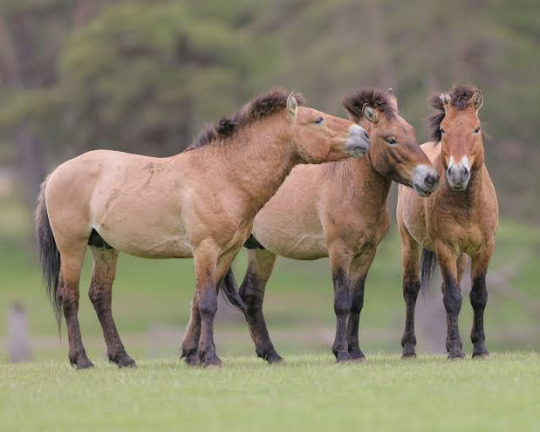
Meanwhile, we do have things like Dartmoor ponies in England and mustangs in North America and Brumbies in Australia. Dartmoor ponies aren't eaten by anything and are considered feral in the sense that they're domestic animals that live wild, but more or less on purpose, with the moor being treated as a common for keeping ponies on, and the nominal owners can just grab one if they want one at any time. Mustangs are accidental colonists of the American West. They are preyed on by wolves, cougars, and other local large predators, but are not wild. they are feral because they're all descendants of European horses and honestly, if we aren't being sentimental about it, they're invasive.
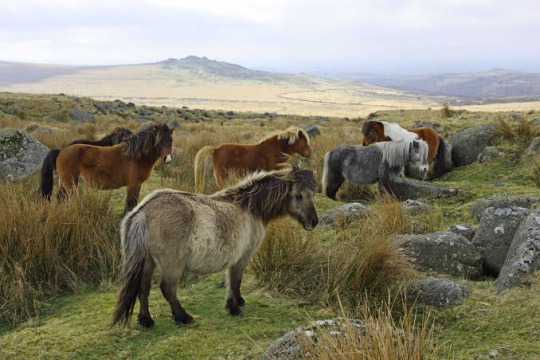
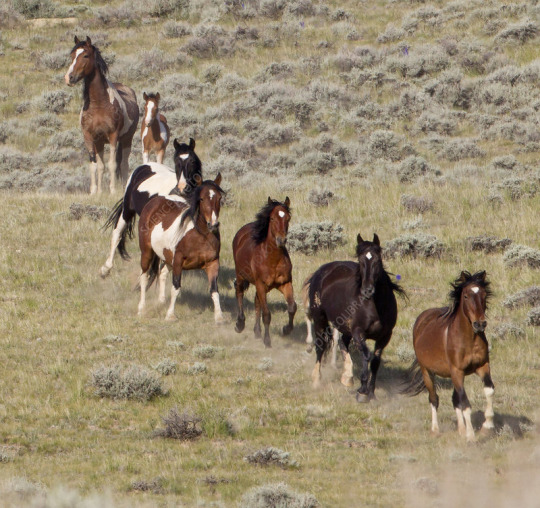
North America has not had a native population of horses since humans arrived on the continent. The facts are often associated. It is commonly held that humans, upon arriving in America, ate the native horses all up. The typical line goes that "when the first humans populated North America, they were so greedy and invasive that they overhunted most of the local large mammals to extinction". but I personally - and in an unhinged I'm-allowed-to-randomly-hold-ONE-fringe-belief-that-I-Made-up-Myself way - don't like that narrative, and there might be evidence in oral myths indicating that First Nations people at least remembered contact with horses prior to European colonisation. At any rate, there aren't wild horses on that side of the planet any more. The mustang - the most classic "wild horse" in imagination - is not wild, but is currently preyed on by everything that WOULD have eaten the OG native horses of America, minus the large predators that have gone extinct since then (sabre-toothed tigers). Whether mustangs are a nice reintroduction that adds a missing element of Horf to the landscape, or agents of ecological devastation, is kind of up in the air. But they are regularly and routinely preyed upon by the same "natural predators" as the wild cousins would have been, albeit in lower numbers. Take-home message: to visualise how interactions of wild horses with predators and the environment would have looked, mustangs are a very good model.
Going back to the "time" element, human interaction has really decreased a lot of the "natural predators" of horses; they were once preyed on by a larger variety, diversity, and number of animals. In the pocket of spacetime when wild horses were common and had a large range, there also used to be a lot more things like hyenas in Europe and Asia. Here's a diagram showing the "prey animals" and "predators" of Pleistocene Europe. Horses are on the bottom shelf on the far right, at a lower opacity, to show they're "prey animals". You can see that there was a greater diversity of predator types, while today there are usually just Your Local Wolf and Your Local Big Cat.
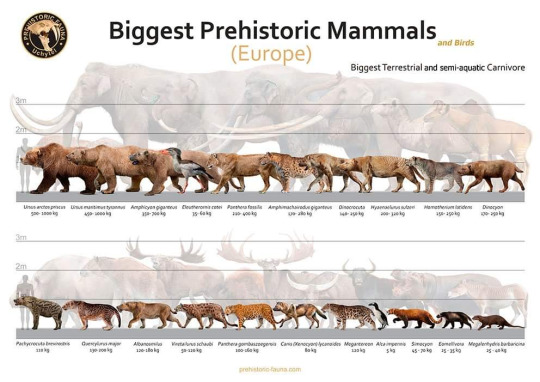
But this diagram puts "people" as "prey animals" - and humans are traditionally The Natural Predators of horses. Looking at that diagram, you can see that the common, smallish-but-not-too-small herd animal, whose defenses are Having Friends and Being Fast, is a delicious-looking proposition. The spectacular depictions of cave horses in Lascaux are showing our kin, but they're also showing our food.
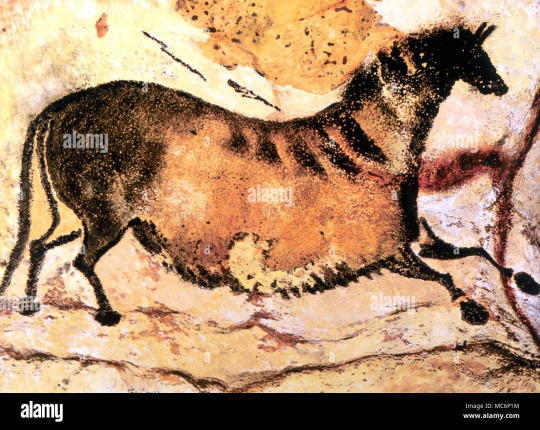
There is a very important Middle Pleistocene site at a lake in Germany called Schöningen 13II-4, with hominin remains dating back to 300,000 years ago (!!!!!) and it's called the Spear Horizon (for the incredibly well-preserved evidence of spears) but a common nickname is the Horse Butchery Site. One of the most ancient preservations of hominin behaviour, culture, skill, tool-making - their/our priorities, their/our methodology, their/our view of the world - is a narrative of eating horse meat. And the hominins at the Horse Butchery Site did it in a way that seems quite rapacious. Entire family groups of horses, coming to the lake to drink, would be butchered at once: Persistent predators: Zooarchaeological evidence for specialized horse hunting at Schöningen 13II-4 - ScienceDirect It seems like the hominins were killing a lot of horses and not using a lot of the meat, because they wanted fat, and horses don't have much of that.
At any rate, human-shaped people and horse-shaped horses have a very, VERY long history of us eating them. WE are their natural predators. And it makes sense. Humans and Equines are all social animals of relatively small sizes and have interacted with each other for an extremely long time. We have observed them, we know them, we grew up together. For quite a lot of that history, we had a simple relationship; we ate them. Now we much prefer to ride them.
Horses have not entirely forgotten this, but appear to have largely forgiven it.
1K notes
·
View notes
Text
Excerpt from this story from National Geographic. All photographs byJoel Sartore:



CARACAL | CARACAL CARACAL Consummate predators, some small wildcats can take down larger prey. The caracal of Asia and Africa is less than two feet tall but has been filmed leaping over nine-foot fences to prey on sheep. PHOTOGRAPHED AT COLUMBUS ZOO AND AQUARIUM, OHIO

PALLAS'S | CATOTOCOLOBUS MANUL A famously grumpy expression made this Central Asian species an Internet star. Conservationists hope the cat’s celebrity will help save its habitat from encroaching farms and other threats. PHOTOGRAPHED AT COLUMBUS ZOO AND AQUARIUM, OHIO
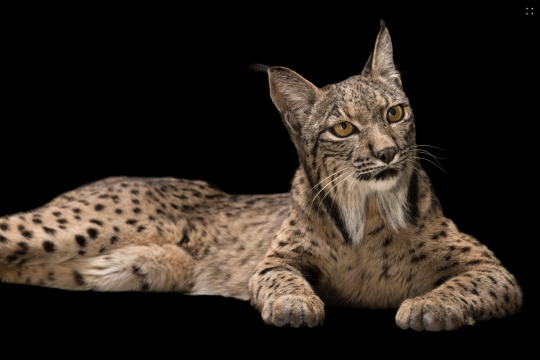
IBERIAN LYNX | LYNX PARDINUS One of the world’s rarest cats, the Iberian lynx is slowly increasing in number as scientists release captive-raised cats and boost populations of rabbits, the lynx’s staple food. PHOTOGRAPHED AT MADRID ZOO AND AQUARIUM, SPAIN

FISHING CAT | PRIONAILURUS VIVERRINUS The cat may look peculiar, but it’s perfectly adapted to its lifestyle: Big eyes help snare prey underwater, double-coated fur keeps out the wet, and partially webbed feet and a muscular, rudderlike tail aid in swimming. PHOTOGRAPHED AT POINT DEFIANCE ZOO AND AQUARIUM IN TACOMA, WASHINGTON

EURASIAN LYNX | LYNX LYNX The largest of the four lynx species, the Eurasian lynx also has a huge range, including most of Europe and parts of Central Asia and Russia. Unlike many other small cats, its population is stable and threats are relatively low—although some isolated subgroups are critically endangered. PHOTOGRAPHED AT COLUMBUS ZOO AND AQUARIUM, OHIO

JAGUARUNDI | SHERPAILURUS YAGOUAROUNDI With long, squat bodies and tiny ears, jaguarundis are otterlike in appearance. Thanks to their huge range—parts of Mexico, Central America, and South America—and lack of widespread hunting, the cat is considered a species of least concern. PHOTOGRAPHED AT BEAR CREEK FELINE CENTER, FLORIDA

LEOPARD CAT | PRIONAILURUS BENGALENSIS. PHOTOGRAPHED AT ANDERSON, INDIANA

RUSTY-SPOTTED CAT | PRIONAILURUS RUBIGINOSUS The smallest of the small cats, the rusty-spotted cat, a native of India and Sri Lanka, can weigh as little as two pounds. Not much is known about the speckled feline, but destruction of habitat, hunting, and hybridizing with domestic cats are threats. PHOTOGRAPHED AT EXMOOR ZOO, ENGLAND

AFRICAN GOLDEN CAT | CARACAL AURATA Inhabiting the rain forests of West and Central Africa, this species is threatened by forest loss and bush-meat hunters. This seven-year-old male, Tigri, is likely the only cat of its kind in captivity. PHOTOGRAPHED AT PARC ASSANGO, LIBREVILLE, GABON

SAND CAT | FELIS MARGARITA. PHOTOGRAPHED AT CHATTANOOGA ZOO, TENNESSEE

CANADA LYNX | LYNX CANADENSIS Like the Iberian lynx, the Canada lynx is a specialist hunter, preying almost exclusively on snowshoe hare. The North American species has giant paws that help it run through deep snow after prey. PHOTOGRAPHED AT POINT DEFIANCE ZOO AND AQUARIUM, WASHINGTON

MARGAY | LEOPARDUS WIEDII. PHOTOGRAPHED AT CINCINNATI ZOO AND BOTANICAL GARDEN, OHIO

SERVAL | LEPTAILURUS SERVAL. PHOTOGRAPHED AT FORT WORTH ZOO, TEXAS
1K notes
·
View notes
Photo
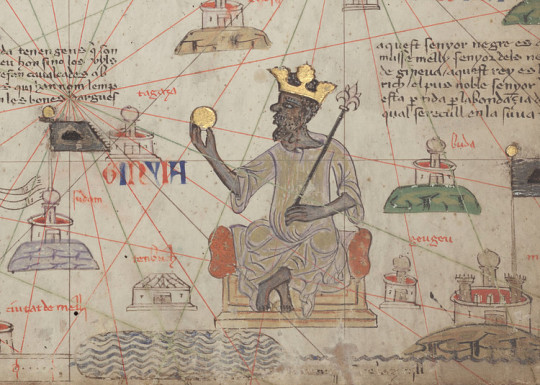
Mansa Musa I
Mansa Musa I was the ruler of the Mali Empire in West Africa from 1312 to 1337. Controlling territories rich in gold and copper, and monopolising trade between the north and interior of the continent, Mali grew extremely wealthy. Mansa Musa was said to have spent so much gold in Cairo that the value of bullion crashed by 20%.
A Muslim like his royal predecessors, Mansa Musa brought back architects and scholars from his pilgrimage to Mecca who would build mosques and universities that made such cities as Timbuktu internationally famous. Mansa Musa's 1324 stopover in Cairo, though, would spread Mali's fame even further and on to Europe where tall tales of this king's fabulous wealth in gold began to stir the interest of traders and explorers.
The Mali Empire
The Mali Empire (1240-1645), the largest and richest empire yet seen in West Africa, was founded by Sundiata Keita (aka Sunjaata, r. 1230-1255). The Mali capital was Niani, and the most important trading city was Timbuktu near the River Niger and located where major waterways and land routes converged. Immense wealth was gained from acting as a trade hub between the interior and southern coast of West Africa and North of Africa across the Sahara desert's caravan routes. Salt was a major commodity traded from the north while from the south came gold and ivory. The empire eventually included Ghana, Walata, Tadmekka, and the kingdom of Songhai and ultimately stretched all the way to the Atlantic coast. Indigenous rulers adopted Islam from their contact with Arab merchants, and the Mali Empire would thus play a significant part in the spread of Islam across West Africa. Locals, or at least urban ones, were converted, which created communities that then attracted Muslim clerics from the north, strengthening the religion's grip on the region. Local leaders would even perform pilgrimages to the Islamic holy sites like Mecca, including their greatest ever ruler, Mansa Musa.
Continue reading...
116 notes
·
View notes
Text
I realize that anti Got Season 8 posting in late 2024 is a bit boomerish, but screw that it's my blog and there's no law stating that I can't post about That Series again.
I've stumbled across an old anti-Daenerys post written by a Sansa fan some months after the show ended and...oh my God. I had nearly forgotten just how batshit crazy those takes are.
Dany is a colonialist. Dany is a white supremacist. If you like her you are both. Martin is just pretending to write her as a hero, in the end he will reveal she was evil all along and freeing slaves was a secret code for enslaving people. Valyria is evil and the Targaryens are evil. Westeros is simultaneously the ancient Americas and Medieval Europe. Essos is Europe but also the Oppressed Middle East.
Sansa is the true anti colonialist hero. Sansa is the true opprossed woman. If you don't support her you are an oppressor and possibly a rapist yourself. The North is good and the Starks are good. When Arya sails West of Westeros sporting the North's banner, she is not partaking in colonialism, in fact, she will be the anti Christopher Columbus. How do we know that? Because she's a Stark, the Starks are good...
It's maddening. No wonder Daenerys fans are driven into a frenzy. It's not irrationality, it's just natural frustration at constantly being held to double standards and fighting some crazy takes.
Now, treating a fantasy tv show fandom as anti-colonial activism is bad enough, but it's clear to me that at least some of these takes are motivated by the fact they see Sansa as the underdog, mistreated by both the characters and sometimes even the narrative.
And here's where things get weird.
I've said many times that I didn't become a full Dany fan until she was heavily mistreated by the narrative, and I'm definitely not alone in this. Back in the day, many people who previously didn't care one bit for Daenerys suddenly ended up defending her or even stanning her.
Like, of course if somebody wants to root for the underdog, the first thing to do is rooting for the actual underdog. Season 8's underdog was Daenerys. Everyone and everything was deadly set against her from the moment she arrived in Winterfell. They constantly disrespected her, undercut her efforts, killed off or villainized her allies, snobbed her non-traditional upbringing, conspired behind her back. And all the while they always asked asked asked for more, nothing she was giving was enough.
In contrast, the Starks' and the North's actions were constantly justified or presented as good, even betrayal (which is a very huge deal in Westeros) or, in one instance, outright racism by the Northern people -this time fully intended by the production, rather than an unintentional outcome of some poor behind-the-scene choices.
At the end, Season 8's Starks were absolute gods who could do no wrong and were always in the right no matter what they did -except their bastard son, who was contaminated by the evil people's blood and has to symbolically kill that part of himself forever.
Well, guess what, people didn't like that. But the newfound Dany fans were perfectly consistent: they wanted the underdog to win, to overcome her hurdles, internal or external, and be happy at the end. If the underdog is Dany, well, then it's time for Dany to win.
It's Sansa stans that see everything in terms of How This Affects My Fave and are willing to bend over the narrative to get what they want. They are perfectly happy with a biased narrative and double standards, they just want it to be biased towards Sansa, and everything is fair game to them, including real life politics and vocabulary, with some hilarious results. For example: Sansa as the voice of the Oppressed Minorities is...a take, to say the least. Her world doesn't even have a prejudice against red hair, as it would have in real life.
And guess what else, this kind of Protagonist-Centered Morality is very similar to the one used by real life colonizers, especially in their "explorations". Not that it matters because this isn't a post-colonial story and it never will be. It's a story about a messed up Fantasy Medieval/Early Renassaince World with Dragons, heavily influenced by various periods of European history. The only vaguely post-colonial element are maybe the zombies-as-slaves metaphor, and I think it's more due to the fact that Martin was probably inspired by old horror Movies pre-dating the Romero ones. And who is liberating slaves in his story, again?
Anyway. 2019-2020 was a really weird time to be a Dany fan, and in hindsight it was crazy how much shit there was around a fantasy series with dragons. Surely five years later people are a little more normal, right? Right?
#asoiaf#anti got#daenerys targaryen#daenerys defense squad#anti sansa stans#sometimes I just think about daenerys and feel like crying#hey bertha mason is another fave and she first appeared in 1849
131 notes
·
View notes
Text
there's absolutely a racism matter that comes into play when discussing people in the west discussing socialist nations or movements in the global south. i feel like i've seen at least half a dozen people, some even calling themselves marxists, who interpreted communists in europe and north america as being inherently pragmatics, consistent applicants of dialectical materialism and atheists, and a the same time interpreted socialists in africa, asia and latin america as inherently religious, populists, guided by moralism and not-actual-marxists. i think that's why the whole "chinese socialism is actually just confucianism and the Innate Moral Beliefs of the Chinese applied in our time" and also the whole "juche is just a red tainted version of the cultural tendency of koreans to be subservient to populist, supreme leaders". i think this also certainly applies to how people generally see african socialism and see a lot of historical socialists in latin america as just new caudillos
27 notes
·
View notes
Text
What is at stake
... in my country, at this very moment.
The contrast between two political and cultural tropes.
This one (40% after the final results of the first round of Sunday's elections: the local dictator wannabe, selling himself as the emerging MAGA surrogate, almost openly backed by Putin):
youtube
vs.
This one (about 30%, but uncertainly split between opportunistic and/or antagonistic competitors, last Sunday evening):
youtube
The first one is the trailer of Andrei Ujică's compelling documentary 'The Autobiography of Nicolae Ceaușescu' (2010), which simply presents a montage of news' reels, running from March 1965 until December 1989. Which is to say, Ceaușescu's entire authoritarian regime. It features an undated news reel of one of his state visits to Pyongyang, where he was always received with the extravagant honors North Korea reserves to the Old Friends of the Kim dynasty. We watch a snippet from a state reception, mandatorily doubled by some form of heartfelt entertainment. The hosts have thoughtfully reserved the show stopper moment for a Romanian folk song hailing from the guest's own region (Oltenia, in the South-West). The Korean singer's diction and rendition are eerily impeccable, but completely mechanical. She obviously has no idea of what she is saying, but that was never a problem, in the World of Make-Believe: the guest liked it and that's exactly what was hoped for. Negotiations will be smashing, you'll see.
These foreign news reels were the only ones allowed to cross our state border, only to be obsessively broadcast during the two-hours daily TV program, on the one and only TV channel available. Almost all the rest of the outside reality could be accessed only by illegal means. Black market, foreign radio or TV channels (which were forbidden, but listened and/or watched, anyways) and the videocassettes that were making the rounds of the happy few owning a VCR and who organized underground movie marathons in their own homes (it could be anything from The Sound of Music to The Thorn Bird to Queen's 1986 Wembley concert to The Exorcist, sometimes watched back-to-back in a single session).
The second one is Voice of America's news service jingle. VOA was, of course, backed by the United States Agency for Global Media and broadcast from Washington D.C, to reach the entire Eastern Bloc. Its frequency was always severely jammed by the Securitate (the Romanian secret police or local STASI, if you prefer), but my family always listened to its programs (or, like millions of others, to Radio Free Europe, its twin USAGM outlet, which used Enescu's Romanian Rhapsody no 1 as its jingle), at all costs (job loss, prison, etc). Collective resilience was almost single-handedly built and consolidated by these two absolutely heroic radio stations, in a local and regional context that sometimes managed to put to shame Orwell's 1984 dystopia. Today, Elon Musk's efforts to dismantle VOA, under a perfectly specious pretext, are felt at a very personal level, as despicable and irresponsible. But also very telling of the strange times we are currently experiencing.
Your perception of what we do consider to be at stake in my faraway country, that is often rolled into one with the rest of the Balkans in one of those early 1900s operettas, might be vastly different from mine. Please remember you might only access a sliver (if anything at all) of what can be defined as 'global reality' and at least agree to disagree.
Barely 15% needed to take our lives back and perhaps even be able to get some damn sleep. SC, who?
36 notes
·
View notes
Text
Slugterra's Cavern Systems
It will always baffle me when people say that the 99 Caverns are the 'central caverns' with there being the Eastern, Northern, Southern and Western cavern systems or that the 99 Caverns means there's 99 Infurnus slugs....
There's clear evidence in the series to support there actually being SIX Slugterra cavern systems and that the 99 Caverns is not the 'central caverns'.
Let's address the location of the 99 Caverns. We know that the 99 Caverns is underneath a place that commonly uses the imperil system of measurement (ie inches, feet, yards etc). And given it snows during Christmas, we can assume the country/continent over the top of the 99 Caverns is the USA/North America.
As for the count of the potential cavern systems, we go to Gateway Cavern and the Gateway Portal. The portal is made up of two rings; the outer which indicates which cavern system we're in (picture below is of the 99 Caverns symbol)

and the inner turn-able ring that shows six different symbols. (the sixth is obscured by the steps in front of it) Said ring will show which cavern system you're going to.

I think people forget to count the sixth symbol on the inner ring since they only see five. Or that they count one of the six as the Deep Caverns whilst the sun represents the Burning World/Surface
We know that there's one for the Eastern Caverns (below)

And that the sun symbol is associated with the Dark Bane or perhaps was meant to be a quick way back to the surface,

As for the other four; we have zero idea of which caverns they lead to




Personal headcanons of mine set them as the Southern, Pacific, European and Southwestern Caverns respectfully.
But now lets look at why the 99 Caverns is NOT the central caverns. Just because the 99 Caverns is canonically the largest and main cavern system we've seen/been in for the series doesn't mean it sits as the middle. Bullseye Cavern is the middle of the 99 Caverns, what the residents of that cavern system believed to be the center of Slugterra since they did not know of the other systems TILL the Goon and co attacked.
With the 99 Caverns under America, why would the Eastern Caverns still be referred as the Eastern Caverns when the closest path to them is from the west? Well that comes back down into world geography history! America is referred to as the West and Asia is referred to the East due to England and the UK being the center of attention. So by 'technicalities' under the UK's own classifications, they'd be the central caverns. Though, I don't think there should be 'central caverns', rather Western (99/under North America), Eastern (under Asia), Northern (European/under Europe), Southeastern (Pacific/under Australia & the surrounding islands)), Southern (under Africa) and Southwestern (under South America)
A very rushed map of an example;

Edit: Completely forgot to mention the Infurnus stuff- so quickly adding that!
There is only 2 known Infurnus slugs; Burpy and Joo-Joo. The idea of a Infurnus being the "defender's slug" of the cavern system. It is only true to Eastern Caverns with Joo-Joo being a slug held in Junjie's family for 2000 years.
There has to be at least a few more Infurnus slugs about, but very much limited in rarity (ie, almost One of a Kind per system)
#slugterra#bajoterra#slugterra headcanon#headcanon#99 caverns#eastern caverns#european caverns#northern caverns#pacific caverns#southeastern caverns#southern caverns#southwestern caverns#slugterra caverns#slugterra map#cavern systems#slugterra theory
29 notes
·
View notes
Note
Do greeks consider themselves as eastern european/balkan or do you hate that ? In france, the greek diaspora consider itself eastern euro and feels a bond with other balkaners, unlike the italians and french e.g, BUT on the english speaking internet it is the whole opposite, you seemed to be offended being called something else than southern european. I remember having an argument on reddit where i was saying that greece is EE because commie times arent a good indicators as it was 30 years ago for only 45 years while the old latin west greek east (catholic vs orthodox, rome vs constantinople) division was better as it lasted 2000 years, on top of being ottoman for 4 centuries which was the OG meaning of balkans and that in southEAST europe there is EAST. But all of the greeks said that they were 100% south europe only like the pigs and not e.g montenegro and that they were actually closer to WE.
The average greek and your thoughts on this ?
I can't speak for the average Greek because there's a joke saying "in the room there are three Greeks and seven opinions", you know...
Balkans and East Europe are not synonyms. The Balkans are a small part in the south of East Europe. Greeks are Balkaners to the core but the more you reach into the north fringes of the Balkans and farther towards North East Europe, the similarities start falling apart. In this sense, Greece is indeed more South Europe than East Europe because Greece has similarities with pretty much all South European countries, even Portugal, and it has fewer similarities with, say, the Baltic countries or Poland or Hungary. Personally, I think the region of noticeable similarities to Greece end somewhere across Croatia and Romania. In the East the similarities may extend farther in the countries where Orthodoxy is the prevalent religion so well into Southwest Russia and then towards Caucasus. Anyway my point is, a Greek will likely get more easily along with a Catholic Spanish or a Portuguese person than with a Catholic Slovenian or Hungarian person who are far closer geographically. Therefore, Greece is indeed more South Europe than East Europe.
The Greek people you noticed who did not get along with French or Italians, that's probably incidental. Typically Greeks get along with both South Europeans and other Balkaners, with the southern Greeks and islanders gravitating towards the former and northern Greeks gravitating towards the latter. Perhaps those Greeks were Northern Greeks. Perhaps they also bonded with other Balkaners on the basis of both being immigrants, as opposed to the local French.
Greece is Southeast and Balkan Europe, therefore it is East Europe by definition. The problem is that a) nowadays Greeks have very poor knowledge of history and b) there is this unfortunate stereotype permeating across the continent that tRuE Europe = Northwest Europe and that the east is backwards and underdeveloped. And because Greece is ALSO a honorary member of West Europe, Greeks have latched on this “convenient” opportunity to at least verbally distance themselves from East Europe, losing parts of their identity and their understanding of it in the process.
Now you may ask “what the hell is a honorary member of West Europe”. Well, Greece. Because of this whole “cradle of western civilisation” thing, the West honorarily accepts Greece as part of Western Europe. I don’t know if people realise that while it’s good when someone tells you “I want you to be part of us out of honour”, it’s extremely problematic in its essence because it screams the inherent superiority syndrome of West Europe. “We have picked up your entire culture so we allow you to be considered West Europe.” Well, thanks, but no thanks, folks.
Take a look at that:

See? It was not just angry Reddit Greeks. This is technically the "official" international stance on the matter.
There are in fact even foreign people who don't think Greece is part of the Balkans at all, which is insane because why would you even call it Balkan "peninsula" if not for Greece being in it??????? I repeat, Greece is 100% a Balkan country. Not only that but Greeks are one of the four Palaeo-Balkan peoples (Greeks - Thracians - Illyrians - Dacians).
And here’s where I am going to add one more layer to your mail, the biggest misconception about the Greeks, the one that the foreigners are just as guilty of, if not even more; you said, Greeks are more Eastern Europeans because of East Rome / Byzantine Empire and Ottomans. Well, that’s only part of it. There is simply no part of Greek history that is not eastern because the Ancient Greek was an eastern civilisation! One of the major ancient civilisations springing from the culture hub of the Near East and its periphery. Greeks interacted for centuries with Egyptians, Persians, Hittites, Phoenicians etc before they finally interacted with westerners, the Romans, and to whom they culturally gave more than they took. But even that was forgotten in the Middle Ages in the west (but not in the eastern - of course - Roman / Byzantine Empire). The Ancient Greek heritage was only re-discovered in West Europe during the Renaissance and the Enlightenment and that’s when West Europeans “remembered” suddenly that they are cultural children of the Ancient Greeks (well they aren’t, at least not organically) and therefore they now have to suffer modern Greece being acknowledged as part of the west because they don’t want to spell out that “Western Civilization” is just the formation of several western contemporary societies using elements from the foundations of an ancient Eastern Civilization. Westerners would love to think West sprang from a parthenogenesis but in truth the West sprang from the East.
So, yes, the Greeks started as Easterners, kept being Easterners and they are still Easterners. This however does not mean that they have all that many similarities to Eastern Europeans who expand on the north. Greeks have more connections to the south, the southwest and to the true east. They are technically less now though compared to all past periods of Greece because it is only after the independence and the formation of the modern state that Greeks became so west-oriented. The reason for this was their urgent need to distance themselves as much as possible from Turkey and find allies and supporters in the west, who would be willing to aid and support in the basis of protecting “the cradle of the West”.
Here I must add that the West has indeed taken a lot from Ancient Greece and respects it way more than the East (due to the recent historical and religious developments there). All I say is it was not organic, it was not the natural evolution of the western culture. And I am not saying Greece should distance itself from the West. No, I do think we should have strong bonds and be companions and co-members and allies but that doesn’t mean we should rewrite history and erase our identity in the name of this alliance. I am fine with Greece being the most west-friendly country of East Europe, which it already is. I just wished Greeks celebrated more their Eastern identity, rekindled their relations to any potential alienated eastern friends and did not fall victims into one of the biggest historical propagandas and misconceptions there are: Ancient Greeks = Western and powerful versus Byzantine and Modern Greeks = Eastern therefore useless and different people.
To end this far too long ongoing discourse, Greeks are all the following:
Europeans
South Europeans
Balkaners
Mediterraneans
(not applying to everybody) descended from Anatolians - Greek Asians - from Asia Minor
East Europeans
currently so politically and financially western allied and so influential to the west that they are essentially perceived to function more like West Europeans than East Europeans, without however being true Western Europeans
41 notes
·
View notes
Text
youtube
21st December is the shortest day of the year and The Winter Solstice.
The gently sloping passageway entering the monumental Maeshowe chambered tomb in Orkney is aligned so that at sunset during the three weeks before and after the shortest day of the year so the light of the setting sun shines straight down it to illuminates the back of the central chamber. The sun’s rays align with a standing stone, the Barnhouse Stone, standing 800 m SSW of Maeshowe. Built around 5,000 years ago, Maeshowe is the finest Neolithic building in North West Europe. It is a masterpiece of Neolithic design and stonework construction, not least for its use of massive individual stones.
Take a look at the short video explaining this fascinating phenomenon on youtube.
45 notes
·
View notes
Text
Public Transport COULD Be Great

Americans visiting Europe, especially those more left-leaning Americans, will always be so impressed when it comes to our public transport. And it does not matter where they visit here. Netherlands? "Amazing Public Transport!" France? "Amazing!" Germany? "Amazing!" Even in the UK they will be impressed.
And I kinda get it. While once upon a time the US made a conserted effort to get people moving via train, that has been almost two centuries ago and by now they just decided that people having cars is making more companies more money, so who needs cheap public transport? And while I personally actually kinda liked the public transport on the east coast while I was visiting the US... Yeah, I am well aware that the east coast (especially the area between New York City and DC) is not quite representative for the US.
However, here is the thing: If you ask most Europeans about their public transport... Well, we'll complain as well.
Because they fucking ruined it!
See, here is the issue, in a lot of parts in Europe, at some point or another the government privatized some or all of the public transport. This hit some countries like the UK especially hard, but Germany was hit also quite a lot.
Because of that a lot of things happened that happened when you try to use capitalist logic onto something that cannot work under capitalism.
For example a lot of rails have been removed in areas where it was not "cost efficient" to run trains. Or if they have not been removed, they are at least no longer used. In Germany you will find that in the area where I am living (North-Rhine-Westfelia) we have somewhat good running public transport. Meanwhile a friend of mine is living in former East Germany. And something you gotta understand about former East Germany: After the reunification a lot of people from East Germany tried to move away from there, thinking they would do better in "West Germany". So you will find a lot of mostly empty villages and towns there. And you know what does not pay under capitalism? Right: Running trains to fairly depopulated villages and towns. So... This friend is forced to use a car all the time. Because the next train station that is actually still in use is 45 minutes by car away.
Sure, technically there is a bus running through her village... It comes 3 times a day mondays to fridays, 2 times a day on Saturday and not at all on Sunday. Also to reach the aforementioned train station, the bus connection would take her almost two hours.
Now mind you: There is a train station about 10 minutes by car from her. But that one has not been in use for almost 20 years. Because, again: It just does not pay. It is not profitable for the company, so it is no longer in use.
And here we get to the issue: Public transport is an amazing thing... But we see again and again, that it really only works in those cases where it is state-run and paid for with taxes. As soon as it is privatized it will just not work. Because, well... In general public transport really is not a thing that will be paying for itself. It is fairly expensive, and to keep it profitable you need to keep raising the prices. (As a German: Believe me, I know!)
Not to mention that company policies will lead to weird stuff happening with the trains. Here in Germany? Well, the biggest train company (that is kinda partly state-owned, but not state-run, so it is run under capitalist ideas) has promised their investors that the trains will not be as delayed as before. But given the piss-poor state in which the rail network is, this is just not feasible. So, what will they do? Simple! If a train gets too delayed they will just cancel it. Will that fuck everyone travelling over way more than letting the train delay for 20 minutes? Yeah. But they do not care. They only care about the investors.
And this is the general issue.
For public transit to work, you need to design the transit network to serve the people - and not to make money. Because it does not matter that there are only some old people left in some depopulated little town in eastern Germany or western England... Those old people deserve to be able to get from their depopulated little town to the next big shopping center and cultural center as well.
As long as you do not design the stuff with those people in mind...
Sure, it is better than no public transport. But it still sucks.
#solarpunk#anarchism#communism#anti capitalism#trains#railroad#trains are awesome#busses#public transport
71 notes
·
View notes
Note
Is it true that indophobic westerners claim that Sanskrit didn't originate in India?
That's not indo-phobia, that's what the research has revealed, including the Vedic religion and the people of northern India, these things were imports by outside groups.
Or rather, were created via invasions during the stone age, copper age and bronze age, how do we know this?
The peoples of northern India are closer related to the peoples of Europe, while the people of southern India are not.
Sanskrit is also closely related to the Indo European languages, while other languages in India are not, they are closer related to the Dravidian languages.
Another evidence of this is the prominence of the wheel as a symbol in India, along with the chariot being a symbol of divinity, the wheel was an invention that most likely originally came from eastern Europe, with the oldest evidence of a wheel coming from Slovenia;

The spoked wheel and chariot were also Sintashta inventions.
Horses most likely were first domesticated there too, allowing these peoples to invade with their pastoralist lifestyle into northern India.

The people most accredited to the spread of Indo European languages across not only Europe, but Eurasia are the Yamnaya people, who are most likely one of the groups responsible for the Aryan invasions of northern India.

Blue eyes and fair blonde hair also originally evolved in Europe, the presence of these gene expressions in the northern Indian, Iranian and some Pakistani minorities, is evidence of these populations being subjected to European invasions in the Bronze Age.
However, the Yamnaya were brunettes, but the later Andronovo peoples possessed the blonde and blue eyed genes, meaning they also invaded these regions.

The peoples of India, Iran and Pakistan were subjected to waves of migrations and invasions from Europe and the Mid East, at least two distinct waves occurred.
The first related to the Copper Age Namazga farming culture from the southern edge of the steppe, who exhibit both the Iranian and Eastern European HG components found in many contemporary Indian and Pakistani groups across the subcontinent.
The second, as mentioned above, came during the late Bronze Age, from similar steppe sources, with a impact on genetics more localized in the north and west.
HG stands for Hunter Gatherers.
Who inspired the tales that created the Indian religions, Sanskrit and influenced their genetics?

38 notes
·
View notes
Photo

Ghana Empire
The Ghana Empire flourished in West Africa from at least the 6th to 13th century CE. Not connected geographically to the modern state of Ghana, the Ghana Empire was located in the western Sudan savannah region (modern southern Mauritania and Mali) sandwiched between the Sahara desert to the north and the rainforests to the south.
Trade in the Ghana Empire was facilitated by the abundance of iron, copper, gold, and ivory and easy access to the Niger and Senegal Rivers and their tributaries. The Ghana kings, residing in the capital at Koumbi Saleh, grew immensely rich, building up stockpiles of the gold nuggets only they were permitted to possess. Consequently, the reputation of Ghana spread to North Africa and Europe, where it was described as a fabulous land of gold. The Ghana Empire crumbled from the 12th century CE following drought, civil wars, the opening up of trade routes elsewhere, and the rise of the Sosso Kingdom (c. 1180-1235 CE) and then the Mali Empire (1240-1645 CE).
West Africa & the Sudan Region
The Sudan region of West Africa (not to be confused with the modern state of that name), where the Ghana Empire would develop, had been inhabited since the Neolithic period as is evidenced by Iron Age tumuli, megaliths and remains of abandoned villages. The Niger River regularly flooded parts of this dry grassland and savannah, which provided fertile land for agriculture beginning at least 3,500 years ago, an endeavour greatly helped by the region's adequate annual rainfall. Cereals such as red-skinned African rice and millet were grown with success, as were pulses, tuber and root crops, oil and fibre plants, and fruits. Fishing and the herding of cattle and goats were other important sources of food.
Local deposits of copper were exploited and used for trade, while metalworking in the region, as indicated by archaeological finds, dates back to at least the 6th century CE. There have been many finds, too, of fine pottery, some of which was traded across the region, as indicated by chemical analysis of the clay. Similarly, gold was probably locally mined or panned and then traded along the numerous waterways of the region, but concrete evidence from this early period is lacking. Indeed, the whole history of the region and the Ghana Empire before the 11th century CE remains vague due to a lack of written sources and the rather meagre results of archaeology. However, the latter has increased dramatically in the 21st century CE, and both the antiquity and extent of West African trade, in particular, are now considered to have been greater than previously thought.
Continue reading...
65 notes
·
View notes
Note
I've been curious as to why in a lot of socialist states, there seems to be such a reverence of their leaders - I understand why strict adherence to the Party is necessary to oppose counter-revolutionaries and for the survival of a Dictatorship of the Proletariat but I've always had trouble recounciling the fact that there seems to always be cults of personalities around leaders.
Is this image of a cult of personality in socialist states completely fabricated by capitalists? I feel like it must at least be exaggerated by the West, and I understand that these leaders are/were popular amongst their populations for the good they have done, but I would like to know if there is more to it.
As a slight aside before the meat of the question, adherence to the party is mainly necessary because as the party of the proletariat, it should sum all of the interests of the class into a single program and a single will. Apart from the issue of survival and defense, it's mainly a political reasoning.
We should have in mind the context of these "cults of personalities". The places in which socialism has imposed itself for any significant amount of time have essentially been imperial periphery, meaning a colonized people with decades of savage exploitation weighing heavily in their minds. The case of the USSR was an imperialist country, although living conditions within the empire were nothing to be envied, and in the case of Eastern Europe, a cautious parallel can be drawn to fascist occupation and the various reactionary dictatorships of the interwar period, with the myriad of little regional wars and population transfers. To sum up, socialism has been a liberatory force, one that sided with the powerless in their most miserable times and brought them to run their own state, and enjoy the full fruits of their collective labor. Keep this point in mind for a moment.
Idolization of individuals is an attitude that has been inherited from nodes of production that benefit from taking the focus away from masses of people as classes by shifting it to extraordinary individuals. It is an aspect of psychology that is still nowadays very hard to escape because it has been conditioned so deeply into the collective consciousness, if one allows me to borrow a Freudian concept. History is taught through individuals, but we also conceive of all political leadership in terms of individuals. The administration of so and so, the such and such era, etc. Most communists also do this to an extent, for instance, when we talk about the history of the USSR or of China or Cuba, we rely on the tenure of individuals or at least use it as a crutch for compartimentalizing periods.
With these two things in mind, it's not surprising to see idolatry of individual communist leaders to happen. I'd agree with you that it's not exactly desirable, but the context in which revolutions take place are the smoldering ashes of the old, not a foundation of freshly-poured concrete. A lot of communist states also leaned into this individual worship, and while I won't get into specific examples, I will say that the ones I know of have a satisfactory explanation, or at the very least the reasoning behind the choice at the time makes sense. Regardless of this, the propaganda that comes out the mouth of the Pentagon is exaggerated and at times complete fabrications.
Let's take a modern example, for a change of pace. It is true that the Kim family has included all general secretaries of the Worker's Party of Korea, and that Korean people in the north have very positive opinions of the Kims. Did Kim Jong Un force all Koreans to have his haircut? or forbid all babies to be named after him? or force every house and establishment to have a portrait of him? Absolutely not.
All of this scare-mongering plays very deftly into the pre-conceived expectation of people in liberal democracies of politicians being polarizing figures or largely disliked. This propaganda simultaneously reinforces a normalization of this expectation, which does prevent some people from acting on their discontent, and also convinces people that there can be no such thing as a politician who genuinely does govern for the benefit of the social majority and is liked for it. "A worker's state can't possibly be so because it's impossible for a state to truly satisfy all people, they must all be under the spell of a personality cult!" thinks the worker living in a bourgeois dictatorship reading the umpteenth ridiculously exaggerated story of Kim's dictatorial whims.
46 notes
·
View notes